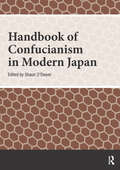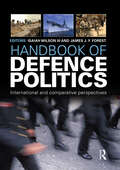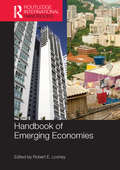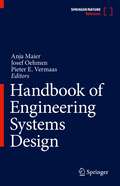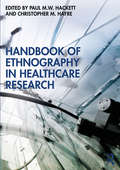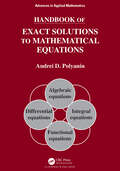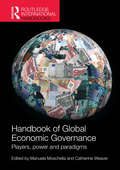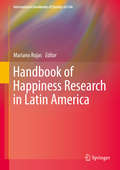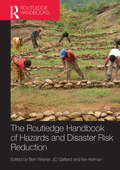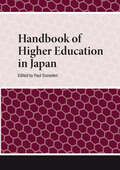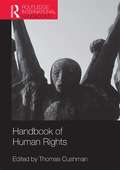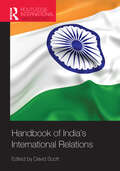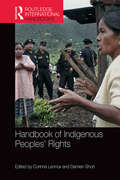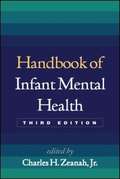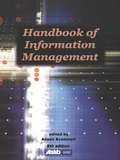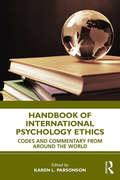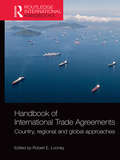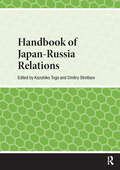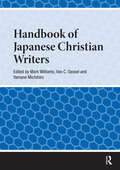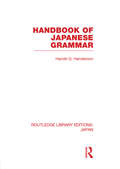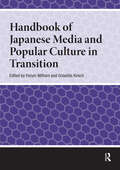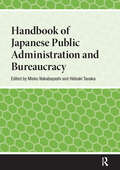- Table View
- List View
Handbook of Confucianism in Modern Japan (Handbooks on Japanese Studies)
by Shaun O'DwyerIn mainstream assessments of Confucianism's modern genealogy there is a Sinocentric bias which is, in part, the result of a general neglect of modern Japanese Confucianism by political and moral philosophers and intellectual historians during the post-war era. This collection of essays joins a small group of other studies bringing modern Japanese Confucianism to international scholarly notice, largely covering the time period between the Bakumatsu era of the mid-19th century and the 21st century. The essays in this volume can be read for the insight they provide into the intellectual and ideological proclivities of reformers, educators and philosophers explicitly reconstructing Confucian thought, or more tacitly influenced by it, during critical phases in Japan's modernization, imperialist expansionism and post-1945 reconstitution as a liberal democratic polity. They can be read as introductions to the ideas of modern Japanese Confucian thinkers and reformers whose work is little known outside Japan—and sometimes barely remembered inside Japan. They can also be read as a needful corrective to the above-mentioned Sinocentric bias in the 20th century intellectual history of Confucianism. For those Confucian scholars currently exploring how Confucianism is, or can be made compatible with democracy, at least some of the studies in this volume serve as a warning. They enjoin readers to consider how Confucianism was also rendered compatible with the authoritarian ultranationalism and militarism that captured Japan's political system in the 1930s, and brought war to the Asia-Pacific region.
Handbook of Defence Politics: International and Comparative Perspectives (Routledge International Handbooks Ser.)
by Isaiah Wilson III James J. F. ForestIssues of defence politics and policy have long been at the forefront of political agendas and defining of international affairs. However, the dramatic changes to the global system that have taken place since the end of the Cold War and parrticularly since the terror attacks on the USA on 11 September 2001 have amplified the world's attention toward political and policy issues of national, regional and global security. The focus of this volume is on examining the fundamental causes of, and defence policy responses to this new 'post-9/11' security environment. Edited by Isaiah (Ike) Wilson III and James J. F. Forest of the US Military Academy, West Point, USA, this volume is international in scope, with pieces written by experts in the field, offering a collection of up-to-date and balanced insights on key contemporary issues of concern to defence policymakers. The book will be an invaluable reference tool for academics and students, researchers in international relations, policymakers, media professionals and government officials.
Handbook of Drugs in Intensive Care
by Henry G W Paw Rob ShulmanA thoroughly updated edition of this well-established guide to drugs and prescribing for intensive care. The book is split into two sections: an A-Z guide to the drugs available, and concise notes on the key topics and situations faced on a daily basis. T
Handbook of Emerging Economies (Routledge International Handbooks Ser.)
by Robert E. LooneyA major new volume in the Routledge International Handbooks series analysing emerging and newly emerged economies, including the BRICS countries (Brazil, Russia, India, China and South Africa) and other likely (Turkey, Indonesia, Mexico, and South Korea) as well as possible (Vietnam, The Philippines, Nigeria, Pakistan, Egypt, Colombia and Argentina) candidates for emerging economy status. Chapters on theories surrounding emerging markets (including the Beijing/Washington Consensus debate) offer an overview of current issues in development economics, in addition to providing an integrated framework for the country case studies. Written by experts, this handbook will be invaluable to academics and students of economics and emerging economies, as well as to business people and researchers seeking information on economic development and the accelerating pace of globalization.
Handbook of Engineering Systems Design
by Pieter E. Vermaas Anja Maier Josef OehmenThis handbook charts the new engineering paradigm of engineering systems. It brings together contributions from leading thinkers in the field and discusses the design, management and enabling policy of engineering systems. It contains explorations of core themes including technical and (socio-) organisational complexity, human behaviour and uncertainty. The text includes chapters on the education of future engineers, the way in which interventions can be designed, and presents a look to the future. This book follows the emergence of engineering systems, a new engineering paradigm that will help solve truly global challenges. This global approach is characterised by complex sociotechnical systems that are now co-dependent and highly integrated both functionally and technically as well as by a realisation that we all share the same: climate, natural resources, a highly integrated economical system and a responsibility for global sustainability goals. The new paradigm and approach requires the (re)designing of engineering systems that take into account the shifting dynamics of human behaviour, the influence of global stakeholders, and the need for system integration. The text is a reference point for scholars, engineers and policy leaders who are interested in broadening their current perspective on engineering systems design and in devising interventions to help shape societal futures.
Handbook of Environmental History in Japan (Handbooks on Japanese Studies)
by Fujihara TatsushiJapan: a land plagued by volcanoes, earthquakes and typhoons, yet blessed with a climate suitable for all manner of agriculture and forestry, and positioned where ocean currents collide and bring an abundance of the ocean's resources to its people; a country which moved quickly from an agrarian pre-industrial society to become one of the world's great economic powerhouses in only a few decades, spoiling water, air and land in the process, bringing misery to many of its people; a country with expansionist desires, colonizing neighboring lands, leading to war, defeat, destruction and, for the first time in history, nuclear devastation and its aftermath; a land and its people which share a remarkable resilience and ability to evaluate and correct their mistakes and renew their trajectory towards a better future. The sixteen chapters of the Handbook of Environmental History in Japan
Handbook of Ethnography in Healthcare Research
by Hackett, Paul M.W.This handbook provides an up-to-date reference point for ethnography in healthcare research. Taking a multi-disciplinary approach, the chapters offer a holistic view of ethnography within medical contexts. This edited volume is organized around major methodological themes, such as ethics, interviews, narrative analysis and mixed methods. Through the use of case studies, it illustrates how methodological considerations for ethnographic healthcare research are distinct from those in other fields. It has detailed content on the methodological facets of undertaking ethnography for prospective researchers to help them to conduct research in both an ethical and safe manner. It also highlights important issues such as the role of the researcher as the key research instrument, exploring how one’s social behaviours enable the researcher to ‘get closer’ to his/her participants and thus uncover original phenomena. Furthermore, it invites critical discussion of applied methodological strategies within the global academic community by pushing forward the use of ethnography to enhance the body of knowledge in the field. The book offers an original guide for advanced students, prospective ethnographers, and healthcare professionals aiming to utilize this methodological approach.
Handbook of Exact Solutions to Mathematical Equations (ISSN)
by Andrei D. PolyaninThis reference book describes the exact solutions of the following types of mathematical equations:● Algebraic and Transcendental Equations ● Ordinary Differential Equations ● Systems of Ordinary Differential Equations ● First-Order Partial Differential Equations ● Linear Equations and Problems of Mathematical Physics ● Nonlinear Equations of Mathematical Physics ● Systems of Partial Differential Equations ● Integral Equations ● Difference and Functional Equations ● Ordinary Functional Differential Equations ● Partial Functional Differential EquationsThe book delves into equations that find practical applications in a wide array of natural and engineering sciences, including the theory of heat and mass transfer, wave theory, hydrodynamics, gas dynamics, combustion theory, elasticity theory, general mechanics, theoretical physics, nonlinear optics, biology, chemical engineering sciences, ecology, and more. Most of these equations are of a reasonably general form and dependent on free parameters or arbitrary functions.The Handbook of Exact Solutions to Mathematical Equations generally has no analogs in world literature and contains a vast amount of new material. The exact solutions given in the book, being rigorous mathematical standards, can be used as test problems to assess the accuracy and verify the adequacy of various numerical and approximate analytical methods for solving mathematical equations, as well as to check and compare the effectiveness of exact analytical methods.
Handbook of Global Economic Governance (Routledge International Handbooks Ser.)
by Catherine Weaver Manuela MoschellaSince the summer of 2007, the world scenario has been dominated by the US sub-prime mortgage crisis and its repercussions on global financial markets and economic growth. As banks around the world wrote down their losses and governments intervened to rescue domestic financial institutions, financial distress severely hit the real economy leading to what has been widely defined as the worst recession since the 1930s. Under these conditions, along with the immediate concern for stemming the effects of the crisis, policy-makers around the world have been debating the long-term measures that have to be adopted in order to reduce the likelihood of future crises and to ensure stable economic growth. Although this debate has not yet produced significant transformations, it indicates a renewed concern about the institutional architecture that is meant to govern the global economic and financial system. This book tackles the issue of what the governance of the global economic and financial system looks like and what the prospects for its reform are. Specifically, the book will address the following three main themes: Governance: What is governance in the international economic system? What forms does it take? How did it come about? How can we study it?; Functions of governance: What are the functions of global economic governance? Who performs them? What are the rules and mechanisms that make global governance possible? Problems and prospects of governance: What are the problems in global economic governance? Is there a trade-off between legitimacy and efficiency? What are the prospects for reform of global economic governance in the aftermath of the global financial crisis? This book will: _ Provide a thorough analysis of the issues at stake in designing international rules and institutions able to govern the global economy; _ Illustrate and analyze virtually all the main institutions, rules, and arrangements that make up global economic governance, inscribing them within the function these institutions, rules, and arrangements are meant to perform; _ Discuss the problems that affect today’s global economic governance and assess alternative proposals to reform the international financial architecture.
Handbook of Happiness Research in Latin America
by Mariano RojasThis book presents original happiness research from and about a region that shows unexpectedly high levels of happiness. Even when Latin American countries cannot be classified as high-income countries their population do enjoy, on average, high happiness levels. The book draws attention to some important factors that contribute to the happiness of people, such as: relational values, human relations, solidarity networks, the role of the family, and the availability and gratifying using of leisure time. In a world where happiness is acquiring greater relevance as a final social and personal aim both the academic community and the social-actors and policy-makers community would benefit from Happiness Research in Latin America.
Handbook of Hazards and Disaster Risk Reduction
by Jc Gaillard Ilan Kelman Ben WisnerThe Handbook provides a comprehensive statement and reference point for hazard and disaster research, policy making, and practice in an international and multi-disciplinary context. It offers critical reviews and appraisals of current state of the art and future development of conceptual, theoretical and practical approaches as well as empirical knowledge and available tools. Organized into five inter-related sections, this Handbook contains sixty-five contributions from leading scholars. Section one situates hazards and disasters in their broad political, cultural, economic, and environmental context. Section two contains treatments of potentially damaging natural events/phenomena organized by major earth system. Section three critically reviews progress in responding to disasters including warning, relief and recovery. Section four addresses mitigation of potential loss and prevention of disasters under two sub-headings: governance, advocacy and self-help, and communication and participation. Section five ends with a concluding chapter by the editors. The engaging international contributions reflect upon the politics and policy of how we think about and practice applied hazard research and disaster risk reduction. This Handbook provides a wealth of interdisciplinary information and will appeal to students and practitioners interested in Geography, Environment Studies and Development Studies.
Handbook of Higher Education in Japan (Handbooks on Japanese Studies)
by Paul SnowdenJust as higher education (HE) in Europe had its beginnings in religious training for the priesthood, HE in feudal Japan, too, provided instruction for a religious life. But while the evolution to secular instruction was gradual in Europe, in Japan it came with a big bang: the opening of the country and consequent Westernization and all that that involved in the mid-19th century.,This first volume in the new Japan Documents Handbook series tells the story in 25 chapters of how Japan's HE system has become what it is now, ending with a very tentative glimpse into the rest of the 21st century. A variety of themes are covered by scholars: chapters that concentrate on governance look at the distinction between national, public, and private institutions; others consider important topics such as internationalization, student recruitment, and faculty mobility. More innovative topics include Women of Color Leading in Japanese Higher Education. All provide copious references to other authorities, but rather than just toe the conventional line they include opinions and proposals that may be contentious or even revolutionary. The editor provides an overview of the subject and its treatment in an Introduction.
Handbook of Human Rights (Routledge International Handbooks)
by Thomas CushmanIn mapping out the field of human rights for those studying and researching within both humanities and social science disciplines, the Handbook of Human Rights not only provides a solid foundation for the reader who wants to learn the basic parameters of the field, but also promotes new thinking and frameworks for the study of human rights in the twenty-first century. The Handbook comprises over sixty individual contributions from key figures around the world, which are grouped according to eight key areas of discussion: foundations and critiques; new frameworks for understanding human rights; world religious traditions and human rights; social, economic, group, and collective rights; critical perspectives on human rights organizations, institutions, and practices; law and human rights; narrative and aesthetic dimension of rights; geographies of rights. In its presentation and analysis of the traditional core history and topics, critical perspectives, human rights culture, and current practice, this Handbook proves a valuable resource for all students and researchers with an interest in human rights.
Handbook of Inclusive Education
by Central Board Of Secondary EducationThe Constitution of India emphasizes the importance of equality of status and opportunity for all citizens, and institutions like CBSE have a duty to support and inspire every child to succeed. In order to promote inclusivity in schools and ensure that children with special needs are accommodated, CBSE has made it mandatory for schools to provide disability-specific learning aids, alternate pedagogies, and exam concessions. To disseminate accurate information on these provisions, CBSE has created a handbook for teachers that provides guidance on identifying children with special needs, creating a barrier-free environment, using instructional designs and assistive technologies, and conducting assessments. While the handbook follows a generic approach, it can be adapted to suit the needs of different contexts and target groups. CBSE believes that the tools and techniques outlined in the handbook will be useful for teachers and will increase access, equity, and participation of all children in the learning process.
Handbook of India's International Relations
by David ScottThis Handbook gives an overview of India’s international relations, given the development of India as a major economic power in the world, and the growing interest in the impact of Asia on the international system in the future. Edited by David Scott of Brunel University, and with chapters written by a variety of experts, the Handbook of India’s International Relations offers an up-to-date, unbiased and comprehensive resource to academics, students of international relations, business people, media professionals and the general reader.There is a pre-publication price on this title, the price rises to £150 three months after publication.
Handbook of Indigenous Peoples' Rights (Routledge International Handbooks Ser.)
by Corinne Lennox Damien ShortThis handbook will be a comprehensive interdisciplinary overview of indigenous peoples’ rights. Chapters by experts in the field will examine legal, philosophical, sociological and political issues, addressing a wide range of themes at the heart of debates on the rights of indigenous peoples. The book will address not only the major questions, such as ‘who are indigenous peoples? What is distinctive about their rights? How are their rights constructed and protected? What is the relationship between national indigenous rights regimes and international norms? but also themes such as culture, identity, genocide, globalization and development, rights institutionalization and the environment.
Handbook of Infant Mental Health
by Charles H. ZeanahWidely regarded as the standard reference in the field, this state-of-the-art Handbook offers a comprehensive analysis of developmental, clinical, and social aspects of mental health from birth to the preschool years. Leading authorities explore models of development; biological, family, and sociocultural risk and protective factors; and frequently encountered disorders and disabilities. Evidence-based approaches to assessment and treatment are presented, with an emphasis on ways to support strong parent-child relationships. The volume reviews the well-documented benefits of early intervention and prevention and describes applications in mental health, primary care, childcare, and child welfare settings. The chapter on psychopharmacology has been updated for the paperback edition.
Handbook of Information Management
by Alison ScammellThis is effectively the eighth edition of Aslib's flagship reference work, Handbook of Special Librarianship and Information Work, which has provided the seminal text on modern information theory, practice, and procedure since 1957. Scammell draws on a substantial background of research and best practice to provide a pragmatic approach to information management in the workplace. This volume covers strategic, legal, management, and marketing issues and highlights the importance of new web-based delivery mechanisms. It includes contributions from outside the UK, mirroring the global nature of information management.Includes:* essential reference to core theories and principles of information organization, retrieval and dissemination* a new chapter exploring the legal issues involved with information on the Internet* new topics including: freedom of information, project management, digital library research, the hybrid library, the effective website and the intranet.
Handbook of International Psychology Ethics: Codes and Commentary from Around the World
by Karen L. ParsonsonThe Handbook of International Psychology Ethics discusses the most central, guiding principles of practice for mental health professionals around the world. For researchers, practicing mental health professionals, and students alike, the book provides a window into the values and belief systems of cultures worldwide. Chapters cover ethics codes from psychological associations and societies on five continents, translating each code into English and discussing vital questions around how the code is put into practice, what it means to association members and society at large, as well as how the code was developed within its unique historical, political, and cultural context.
Handbook of International Trade Agreements: Country, regional and global approaches (Routledge International Handbooks)
by Robert E. LooneyInternational trade has, for decades, been central to economic growth and improved standards of living for nations and regions worldwide. For most of the advanced countries, trade has raised standards of living, while for most emerging economies, growth did not begin until their integration into the global economy. The economic explanation is simple: international trade facilitates specialization, increased efficiency and improved productivity to an extent impossible in closed economies. However, recent years have seen a significant slowdown in global trade, and the global system has increasingly come under attack from politicians on the right and on the left. The benefits of open markets, the continuation of international co-operation, and the usefulness of multilateral institutions such as the World Trade Organization (WTO), the International Monetary Fund and the World Bank have all been called into question. While globalization has had a broadly positive effect on overall global welfare, it has also been perceived by the public as damaging communities and social classes in the industrialized world, spawning, for example, Brexit and the US exit from the Trans-Pacific Partnership. The purpose of this volume is to examine international and regional preferential trade agreements (PTAs), which offer like-minded countries a possible means to continue receiving the benefits of economic liberalization and expanded trade. What are the strengths and weaknesses of such agreements, and how can they sustain growth and prosperity for their members in an ever-challenging global economic environment? The Handbook is divided into two parts. The first, Global Themes, offers analysis of issues including the WTO, trade agreements and economic development, intellectual property rights, security and environmental issues, and PTAs and developing countries. The second part examines regional and country-specific agreements and issues, including NAFTA, CARICOM, CETA, the Pacific Alliance, the European Union, EFTA, ECOWAS, SADC, TTIP, RCEP and the TPP (now the CPTPP), as well as the policies of countries such as Japan and Australia.
Handbook of Japan-Russia Relations (Handbooks on Japanese Studies)
by Kazuhiko TogoThe history of official relations between Russia and Japan encompasses a period of a little more than one hundred and fifty years, but stretch back unofficially for at least double that amount of time. But for both Russia and Japan, these relations have never been a key element of foreign policy, indispensable or intrinsically important for their diplomatic strategy. It is also noteworthy that for most of this time Russia and Japan were enemies, rivals, competitors. For both parties the significance of bilateral relations to a large extent was determined by their geographical proximity. This geographically predestined relationship can be characterized as “distant neighbors.” At the same time, at certain historical stages, this neighborhood was not so distant. The countries managed to establish relations in the economic sphere, while tourism, cultural, scientific and educational ties were actively developing. The complexity of the relations which developed for just over three centuries is worthy of study. This book analyzes these three centuries of Japan-Russia relations so as not to miss out any essential factors of the relationship.
Handbook of Japanese Christian Writers (Handbooks on Japanese Studies)
by Van C. Gessel Mark Williams Yamane MichihiroAlthough a century and a half of Christian proselytizing has only led to the conversion of about one percent of the Japanese population, the proportion of writers who have either been baptized or significantly influenced in their work by Christian teachings is much higher. The seventeen authors examined in this volume have all employed themes and imagery in their writings influenced by Christian teachings. Those writing between the 1880s and the start of World War II were largely drawn to the Protestant emphasis on individual freedom, though many of them eventually rejected sectarian affiliation. Since 1945, on the other hand, Catholicism has produced a number of religiously committed authors, led by figures such as Endo Shusaku, the most popular and influential Christian writer in Japan to date. The authors discussed in these essays have contributed in a variety of ways to the indigenization of the imported religion.
Handbook of Japanese Grammar (Routledge Library Editions: Japan)
by Harold G HendersonThis grammar has been written to help the student to think in the Japanese way. Part One contains several introductory notes on Nomenclature, Syntax, Verbs, Aru, Iru, Oru, on Adjectives and on Foreign Words. Part Two concentrates on connectives – the particles and suffixes which modify the sense of other words or show the relationship of these words to each other. These connectives, the heart of Japanese grammar, present unusual difficulty to foreign students. Arranged alphabetically in dictionary form, each word is followed by a textual explanation of how it is used and of its various meanings, with cautions as to its translation. The forms covered include not only those of the "standard" colloquial literary or bungo styles, but also the more common colloquialisms and provincial forms, whether or not these are strictly grammatical. No other text available makes as through or as complete a classification.
Handbook of Japanese Media and Popular Culture in Transition (Handbooks on Japanese Studies)
by Griseldis Kirsch Forum MithaniThe Handbook of Japanese Media and Popular Culture in Transition brings together new research and perspectives on popular media phenomena, as well as shining a spotlight on texts that are less well known or studied. Organized into five thematic sections, the chapters span a diverse range of cultural genres, including contemporary film and television, postwar cinema, advertising, popular fiction, men’s magazines, manga and anime, karaoke and digital media. They address issues critical to contemporary Japanese society: the politicization of history, authenticity and representation, constructions of identity, trauma and social disaffection, intersectionality and trans/nationalism. Drawing on methods and approaches from a range of disciplines, the chapters make explicit the interconnections between these areas of research and map out possible trajectories for future inquiry. As such, the handbook will be of value to both novice scholars and seasoned researchers, working within and/or beyond the Japanese media studies remit.
Handbook of Japanese Public Administration and Bureaucracy (Handbooks on Japanese Studies)
by Mieko Nakabayashi Hideaki TanakaThis Handbook focuses on Japan's public administration and bureaucracy at its national level, and the effects of national politics on administrative decision-making and outcomes. It also provides in-depth analysis and description of the Japanese politics-civil service relationship. As the Japanese government is relatively centralized, an understanding of its national-level public administration is vital to comprehending the nature of Japanese bureaucracy. This handbook is divided into four parts: the history of Japanese bureaucracy; the bureaucratic system and underlining laws, rules, and regulations; the relationship between politics and the legislative process; and bureaucracy in practice in the 12 major ministries. It will make an important contribution to studies on politics and governance in Japan, and will become essential reading for scholars in both their research and teaching.
